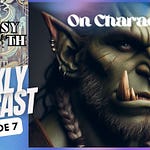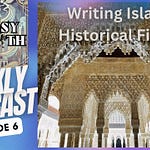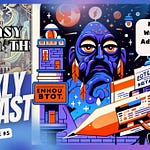Introduction
Tales of the fantastic have always been intertwined with faith and religion. No doubt the genesis story in the Bible and the origins of the universe in mythologies of ancient times have inspired many a writer to come up with belief systems for the peoples of their world(s). Early fantasy writers such as Tolkien and C. S. Lewis are known for their religious symbolism.
Religion is the word to describe the sociocultural systems that help organise beliefs, worldviews and what is holy and unholy. Faith is the belief that one has about the divine. You can have faith without needing religion, and I have met people who outwardly appear religious but have little faith.
C. S. Lewis’s The Lion, the Witch and the Wardrobe is straight up allegory, with Aslan fulfilling a messianic role and even sacrificing himself for the sins of Edmund, before coming back to life. The Pevensies are often referred to as Sons and Daughters of Adam and Eve and in The Last Battle, fought against Tash, the anti-Christ. There is even a false Prophet with a donkey dressed in a lion skin. After the battle, the protagonist finds himself in a Narnia remade, better, it has become the eternal garden. In the prequel, The Magicians Nephew, we follow Digory and Polly as they witness the creation of the universe and Narnia.
Tolkien’s weaving of mythology and faith are a lot more subtle. He leans heavily on Nordic mythology with his Maiar and Valar referred to as God like beings, such as Ulmo and Aulë. However, Tolkien has included a One true God in his stories too, Eru Iluvatar, He That is Alone. His monotheism is of the type that is synonymous with the Abrahamic faiths (Semitic Monotheism) and not like Hindu or Greek monotheism, though there is some polytheistic ideas here too, in the creation of the people and places in Middle-Earth. Other religious themes include the struggle against temptation, which is symbolised by the rings of power in the novels. Those that seek power and control fall under the sway of the rings, but those who only wish to serve their fellows are able to resist it. Then there is the fall of Gandalf into darkness whilst battling a literal demon wreathed in flames, before being born again as Gandalf the White. Further still, Galadriel offers the Fellowship the sacrament by making them drink from a cup and eat lembas biscuits.
World-building and Religion
Sociologically, religion is part of the fabric of society and is a driving force in our early socialisation. As humans, we are obsessed with the idea of a divine supernatural force and have given this force various names including nature, the universe, science, but most commonly ‘God’. In Europe, the Church and the State separated during the 17th and 18th Century Enlightenment Movement. This movement spread from there to also encompass art, literature and the sciences. This is central to understanding the attitudes of people in the West towards religion. However, from Turkey to China, this ‘enlightenment movement’ did not have an influence until the 20th and 21st centuries. This is perhaps why religions such as Islam, Hinduism, Sikhism, Buddhism and even Christianity are still going strong whilst Christianity in the West is declining. The Marxist idea that human invented God to help explain things and provide us comfort has began to prevail. However, in Islamic thinking there is no separation of religion and science. Science explains things better than religion does, possibly because the people of the time at which religions developed lacked the scientific tools to understand how the world and the cosmos work. In Islam, our belief is not blind faith, but relies on the rational explanations that all things in the universe are contingent on something else, which would lead us down an endless rabbit hole. In the end, rationally speaking, there has to be something that all other things are dependent on. Therefore, for Muslims, science is the study of patterns in the contingent universe of God’s Will and Command.
The point, before it gets away from me, is that as humans we have an obsession with God, religion and trying to understand our role in the universe. Therefore, our fictional worlds need to also be steeped in this obsession. Thematically, religion may be dealt with in differently depending on the author’s own perspective, but we will come back to that.
Belief systems are either:
Theism: is the belief that all things are dependent in some way on one supreme or ultimate being. Islam, Christianity and Judaism fall into this category. This is different from Deism.
Deism: is the belief that God exists but is not involved in the world in the same personal way.
Pantheism: that the universe itself is God, therefore all the laws of the universe and its substance is all part of God.
Polytheism: is the belief in many gods. Most other religions fall under this category.
Totemism: a mystical relationship between a group of an individual and a totem, which is either a physical being or an inanimate object, like an animal or the Sun.
Animism: is the belief that all things exude a spiritual essence and a life, and that these spirits can interact with and influence human life. Shamanism is the belief that certain individuals can access this world of malevolent and benevolent spirits.
Your worldbuilding should include a range of these, depending on how primordial or modern your world is. So, if your characters are still living in small hunter/gatherer communities, they may be animists or totemists. If your world is more medieval, they are likely to be monotheists and/or polytheists, which creates good grounds for conflict. Joe Abercrombie’s First Law books are good example of this with a battle between the Church and other religions centre stage. Game of Thrones features different religions, but the characters are more driven by personal power or vengeance than their religious beliefs. If your book is more steampunk or cyberpunk, its likely to have a mixture of Monotheism, Deism and Pantheism in your story.
In my books, whilst other religious beliefs may exist in my fictional worlds, the belief in a Creator God take primacy. One of my pipeline projects is centred around an ancient people discovering a monolith in the middle of a wilderness through which God communicates with them. Control of this monolith becomes a catalyst for conflict. The eventual dominance of this monotheistic religion also leads to conflicts in its borderlands.
Themes and Symbols
Religion and belief in fiction can be part of an outward expression of themes or an inward dialogue on the characters’ search for meaning. The most common themes are the battle between Good vs Evil. High fantasy and epic fantasy tends towards a literal battle of Good vs Evil, e.g. Gandalf vs. Sauron, Aslan vs. the White Witch, Harry Potter vs. Voldermort (although Rowling doesn’t like calling it fantasy). Or it can be more defused, with characters operating in the grey area between Good and Evil. It is more realistic to show that your characters believe they are on the side of Good, even if other characters see them as being on the side of Evil. For example, George W. Bush thought he was fighting a holy war during the ‘War on Terror’, whilst Bin Laden saw America as the Great Evil of our time and was angry with their colonisation and dominance over the Middle-East.
Another theme is life vs. death, which is a staple of dark and Grimdark fantasy. Anna Smith Spark’s books are a balancing act between revulsion and elation, violence and pleasure, life and death. Both of these two themes are also about Power and Control. The conflicts that we have seen in the past century and that are currently happening in the world have utilised religion for propaganda and to offer some form of sick justification for oppression. The Nazi believed in the superiority of the White Christian, the Zionist believe in their superiority over the Palestinians and Arabs, and Donald Trump just believes in his own superiority.
Fantasy fiction is also full of Divine Interventions, from the ancient Greco-Roman and Nordic mythologies, to Harry Potter, in which the power of love transcends magical forces. Though these days, dues ex machina is considered a no-no, unless the concept is baked directly into the story.
Fantasy Fiction is also obsessed with the Chosen One Prophecy, where either someone will save or destroy the world. Again, more recent fictional works have played on this concept heavily, such as Anakin Skywalkers arc as the Chosen One in the Skywalker Saga, and some have even attempted to subvert it for a more interesting story. In fact, subverting tropes is now good business. Another theme that plays well with the Chosen One trope is that of Sacrifice and Martyrdom. Who can forget Ned Stark losing his noble head because he was unwilling to bend his principles and beliefs? Sacrifice can be literal, in that a character is giving up their life for the sake of the greater good or for their friends. Martyrdom is much more subtle and difficult to set up but tends to have a bigger payoff in terms of the plot.
Conclusion
Religion is an important part of our world and therefore it needs to be part of your fantasy world. Your places and characters can gain much depth by the inclusion of communal and personal beliefs, with rituals and festivals providing a shape and uniqueness to your peoples. There is a lot of scope here for dealing with today’s difficult topics and world events by creating parallels in your fictional worlds. You can use powerful allegory, like C. S. Lewis, or you can be more subtle like Tolkien. You can make religion a central source of conflict like Abercrombie’s First Law books, or part of the milieu like George R R Martins A Song of Ice and Fire books. Either way, religion and belief need to be in the mix.
Don’t forget to Like, Share ,Subscribe and leave a Comment. I reply to every comment that I receive. Thanks for joining me on Fantasy and Faith—until next time, keep dreaming, keep writing, and let your stories shine.














Share this post